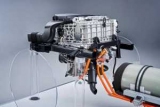Jaguar Land Rover project aims for hydrogen SUVs by 2030
Опубликованно 20.08.2020 09:40

Jaguar Land Rover (JLR) is embarking on a serious hydrogen power research project with the aim of developing fuel cell-powered versions of its larger vehicles.
Should the research effort – which is known as Project Zeus – prove successful, the fuel cell technology would most likely be ready for production use around the time of the next-generation Range Rover Evoque’s arrival in the middle of the 2020s and then be used for zero-emissions versions of larger models in the future.
The British firm is currently working on several battery electric vehicles (BEVs) to join the existing Jaguar I-Pace, including a new Jaguar XJ. However, the hydrogen project could give it another powertrain option as the British government’s plan to ban the sale of internal combustion-engined vehicles by 2035 or sooner approaches.
Project Zeus was described by JLR product engineering chief Nick Rogers in a recent online event as “really, really important”. He added that the company will soon reveal a driveable hydrogen fuel cell concept car.
“We’re looking for the right propulsion systems – ones that see minimum interference to the environment,” said Rogers.
“With hydrogen, we believe there’s a key place [for it in our line-up]. We’re developing and investing in that, and we’re getting great support to do that.”
While it’s still early days and the focus is on developing the hydrogen powertrain technology, the first concept developed as a result of Project Zeus is likely to be an Evoque-sized SUV.
The technology is being seriously considered for use in JLR’s large vehicles in the future – particularly within the Land Rover range. The Range Rover, Range Rover Sport and Range Rover Velar would all be natural choices for hydrogen power, given their large size and need for a long range and flexible usage.
Категория: Автотехника


